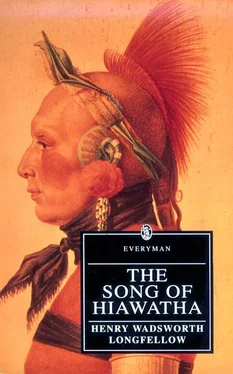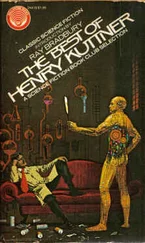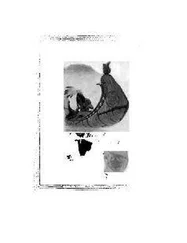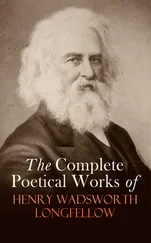But the fierce Kabibonokka
Had his dwelling among icebergs,
In the everlasting snow-drifts,
In the kingdom of Wabasso,
In the land of the White Rabbit.
He it was whose hand in Autumn
Painted all the trees with scarlet,
Stained the leaves with red and yellow;
He it was who sent the snow-flake,
Sifting, hissing through the forest,
Froze the ponds, the lakes, the rivers,
Drove the loon and sea-gull southward,
Drove the cormorant and curlew
To their nests of sedge and sea-tang
In the realms of Shawondasee.
Once the fierce Kabibonokka
Issued from his lodge of snow-drifts
From his home among the icebergs,
And his hair, with snow besprinkled,
Streamed behind him like a river,
Like a black and wintry river,
As he howled and hurried southward,
Over frozen lakes and moorlands.
There among the reeds and rushes
Found he Shingebis, the diver,
Trailing strings of fish behind him,
O'er the frozen fens and moorlands,
Lingering still among the moorlands,
Though his tribe had long departed
To the land of Shawondasee.
Cried the fierce Kabibonokka,
"Who is this that dares to brave me?
Dares to stay in my dominions,
When the Wawa has departed,
When the wild-goose has gone southward,
And the heron, the Shuh-shuh-gah,
Long ago departed southward?
I will go into his wigwam,
I will put his smouldering fire out!"
And at night Kabibonokka,
To the lodge came wild and wailing,
Heaped the snow in drifts about it,
Shouted down into the smoke-flue,
Shook the lodge-poles in his fury,
Flapped the curtain of the door-way.
Shingebis, the diver, feared not,
Shingebis, the diver, cared not;
Four great logs had he for firewood,
One for each moon of the winter,
And for food the fishes served him.
By his blazing fire he sat there,
Warm and merry, eating, laughing,
Singing, "O Kabibonokka,
You are but my fellow-mortal!"
Then Kabibonokka entered,
And though Shingebis, the diver,
Felt his presence by the coldness,
Felt his icy breath upon him,
Still he did not cease his singing,
Still he did not leave his laughing,
Only turned the log a little,
Only made the fire burn brighter,
Made the sparks fly up the smoke-flue.
From Kabibonokka's forehead,
From his snow-besprinkled tresses,
Drops of sweat fell fast and heavy,
Making dints upon the ashes,
As along the eaves of lodges,
As from drooping boughs of hemlock,
Drips the melting snow in spring-time,
Making hollows in the snow-drifts.
Till at last he rose defeated,
Could not bear the heat and laughter,
Could not bear the merry singing,
But rushed headlong through the door-way,
Stamped upon the crusted snow-drifts,
Stamped upon the lakes and rivers,
Made the snow upon them harder,
Made the ice upon them thicker,
Challenged Shingebis, the diver,
To come forth and wrestle with him,
To come forth and wrestle naked
On the frozen fens and moorlands.
Forth went Shingebis, the diver,
Wrestled all night with the North-Wind,
Wrestled naked on the moorlands
With the fierce Kabibonokka,
Till his panting breath grew fainter,
Till his frozen grasp grew feebler,
Till he reeled and staggered backward,
And retreated, baffled, beaten,
To the kingdom of Wabasso,
To the land of the White Rabbit,
Hearing still the gusty laughter,
Hearing Shingebis, the diver,
Singing, "O Kabibonokka,
You are but my fellow-mortal!"
Shawondasee, fat and lazy,
Had his dwelling far to southward,
In the drowsy, dreamy sunshine,
In the never-ending Summer.
He it was who sent the wood-birds,
Sent the robin, the Opechee,
Sent the bluebird, the Owaissa,
Sent the Shawshaw, sent the swallow,
Sent the wild-goose, Wawa, northward,
Sent the melons and tobacco,
And the grapes in purple clusters.
From his pipe the smoke ascending
Filled the sky with haze and vapor,
Filled the air with dreamy softness,
Gave a twinkle to the water,
Touched the rugged hills with smoothness,
Brought the tender Indian Summer
To the melancholy north-land,
In the dreary Moon of Snow-shoes.
Listless, careless Shawondasee!
In his life he had one shadow,
In his heart one sorrow had he.
Once, as he was gazing northward,
Far away upon a prairie
He beheld a maiden standing,
Saw a tall and slender maiden
All alone upon a prairie;
Brightest green were all her garments,
And her hair was like the sunshine.
Day by day he gazed upon her,
Day by day he sighed with passion,
Day by day his heart within him
Grew more hot with love and longing
For the maid with yellow tresses.
But he was too fat and lazy
To bestir himself and woo her.
Yes, too indolent and easy
To pursue her and persuade her;
So he only gazed upon her,
Only sat and sighed with passion
For the maiden of the prairie.
Till one morning, looking northward,
He beheld her yellow tresses
Changed and covered o'er with whiteness,
Covered as with whitest snow-flakes.
"Ah! my brother from the North-land,
From the kingdom of Wabasso,
From the land of the White Rabbit!
You have stolen the maiden from me,
You have laid your hand upon her,
You have wooed and won my maiden,
With your stories of the North-land!"
Thus the wretched Shawondasee
Breathed into the air his sorrow;
And the South-Wind o'er the prairie
Wandered warm with sighs of passion,
With the sighs of Shawondasee,
Till the air seemed full of snow-flakes,
Full of thistle-down the prairie,
And the maid with hair like sunshine
Vanished from his sight forever;
Never more did Shawondasee
See the maid with yellow tresses!
Poor, deluded Shawondasee!
'T was no woman that you gazed at,
'T was no maiden that you sighed for,
'T was the prairie dandelion
That through all the dreamy Summer
You had gazed at with such longing,
You had sighed for with such passion,
And had puffed away forever,
Blown into the air with sighing.
Ah! deluded Shawondasee!
Thus the Four Winds were divided
Thus the sons of Mudjekeewis
Had their stations in the heavens,
At the corners of the heavens;
For himself the West-Wind only
Kept the mighty Mudjekeewis.
Downward through the evening twilight,
In the days that are forgotten,
In the unremembered ages,
From the full moon fell Nokomis,
Fell the beautiful Nokomis,
She a wife, but not a mother.
She was sporting with her women,
Swinging in a swing of grape-vines,
When her rival the rejected,
Full of jealousy and hatred,
Cut the leafy swing asunder,
Cut in twain the twisted grape-vines,
And Nokomis fell affrighted
Downward through the evening twilight,
On the Muskoday, the meadow,
On the prairie full of blossoms.
"See! a star falls!" said the people;
"From the sky a star is falling!"
There among the ferns and mosses,
There among the prairie lilies,
On the Muskoday, the meadow,
In the moonlight and the starlight,
Fair Nokomis bore a daughter.
And she called her name Wenonah,
As the first-born of her daughters.
And the daughter of Nokomis
Grew up like the prairie lilies,
Grew a tall and slender maiden,
With the beauty of the moonlight,
With the beauty of the starlight.
Читать дальше












